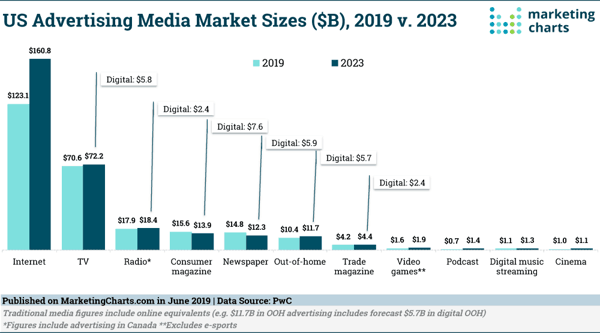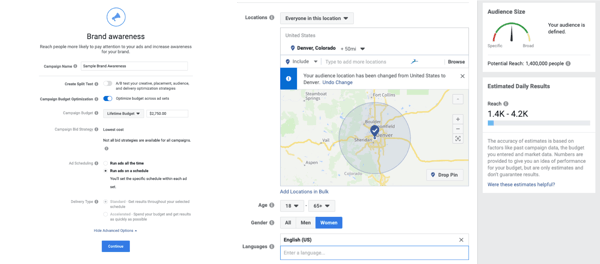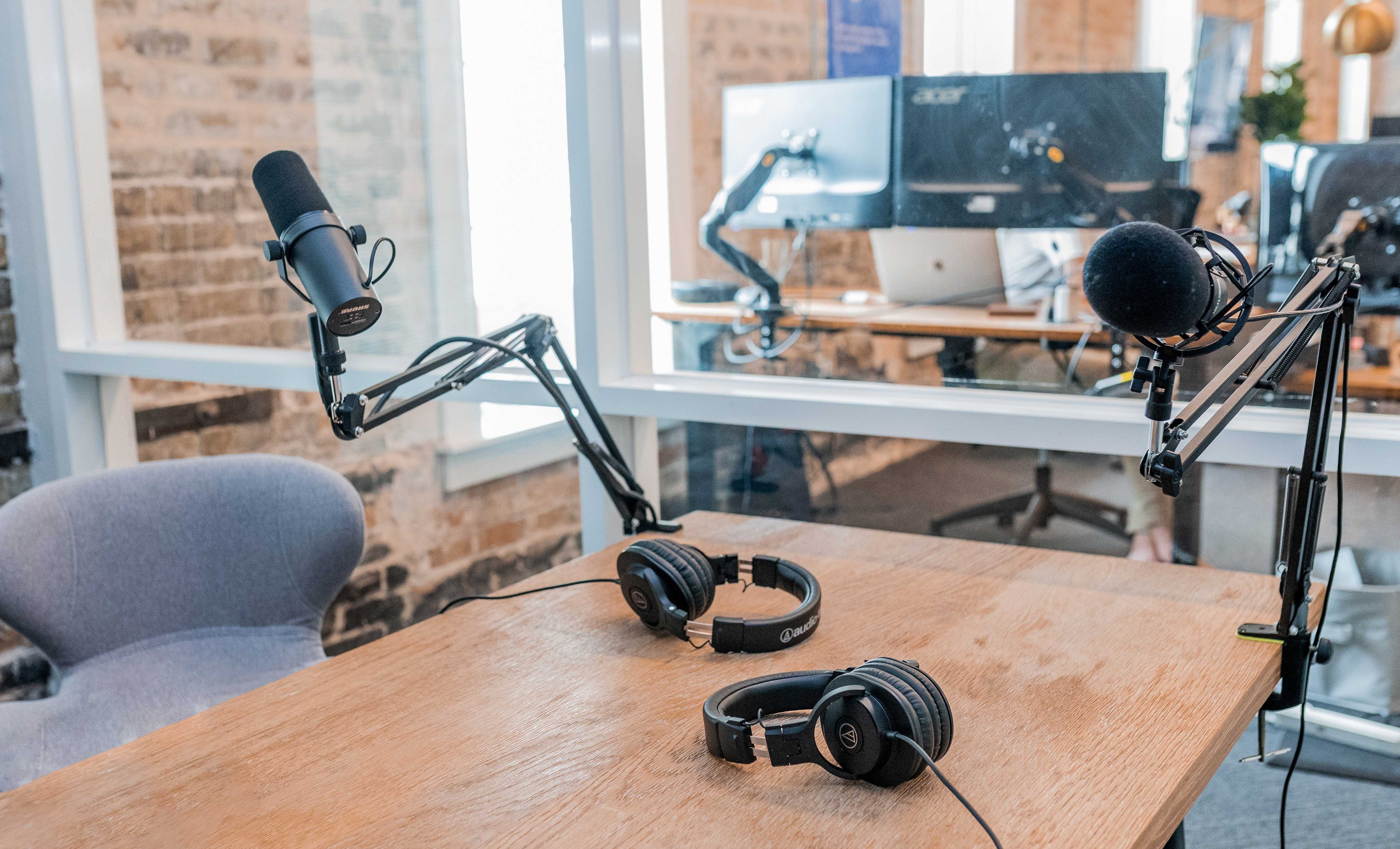What Is Native Advertising?
The term native advertising was first coined in 2011, but the practice creating ads that fit seamlessly within the context of the channel in which...

Recently, we had an introduction call with a prospective client, and they asked us: "what is digital marketing, anyway?" It’s honestly not a question we’ve received before, at least not that directly, and so we thought it would be a good idea to dive into the answer here – and why digital marketing should be an essential part of your marketing plan.
Technically, digital marketing is any marketing that leverages internet technologies to deliver messages or experiences to your audience.
So by this definition, everything from your website, social channels, display ads, email, SEO, and SEM is digital marketing.
Seeing this list of what channels are considered digital marketing may also start explaining why it's so important. It basically covers the entire consumer journey.
In fact, PWC latest annual Global Entertainment & Media Outlook report drives home the importance of digital marketing as it dwarfs the number two channel, TV advertising, in terms of spend – and the gap is growing larger each year.

The reason such a dramatic gap is because we as a society – especially in the US – are considered “extremely online.”
The great thing about digital marketing is that, when used right, it can serve as a great equalizer between large brands and smaller ones. Thanks to the internet, a company no longer has to put all of their eggs into a TV commercial or direct mail push. Instead, digital marketing allows companies – big and small – to be more strategic with their marketing. With digital marketing, you can:
At Mighty Roar, we do a lot of consumer decision journey mapping with our clients. CDJ mapping is a way to outline what the various personas that make up your target audience are doing at each stage of their buying journey.
Consumer Decision Journey (CDJ) mapping, paired with digital marketing, helps you to take advantage of opportunities to reach the right people, with the right message, at the right time.
Can this be done with traditional media? Sure.
A restaurant could place a radio buy that runs during the commute home to try and influence that night’s dinner choice. However, just because your ad runs during a time that makes sense, doesn’t mean that the driver of the car is in the mindset where it will stick with them.
As an example, let’s assume you’re the restaurant. Which of the following seems more likely to drive traffic into your store?
A. Producing one radio spot, based on some quick and limited audience research and then purchasing media to run your ad during the commute home for eight weeks.
B. Testing multiple ads on Yelp and Google search against keywords and geographic locations that are relevant to your restaurant. Also timing those ads to run during dinner time. Plus, setting up a dedicated landing page to encourage email sign-ups to send promotional offers and event notifications to interested customers moving forward, lessening your dependence on paid ads over time.
It’s a tough choice, right? Well, before you pick, consider the last time you were in your car during rush hour. Were you listening to the car radio or Spotify...or Sirius...or a Podcast?
Another factor to consider in our restaurant example is that your radio spot can’t be effectively measured. Sure you could ask every customer that comes in if they heard it and if it’s what made them come in, but is that realistic or a reliable way to judge if your spend was worth it?
One of the most compelling advantages of digital marketing is the ability to research, manage, track, analyze, and improve online advertising campaigns at any point.
Let’s say you did run the radio spot and saw a significant uptick in foot traffic into your restaurant. The ad worked, right?
Maybe.
They could have seen an influential online review or a friend, or maybe something that you had posted on social media that week got their attention. Without the measurement that digital marketing can provide, there’s no way to gain a full picture of what is influencing your customers or your business.
The best part is that, while most consumers are of course aware that their digital activity is being tracked, they don’t notice because it seamlessly integrates into their user experience in a non-intrusive way.
In fact, while privacy is always a concern of consumers, many want to be tracked (ethically, of course) if it will provide a more personalized experience. Imagine a customer returning to your site and seeing an option to re-order their same order from the last visit. That would be pretty convenient, no?
Or, let’s say you’re not a restaurant and you sell products. Your website can tell you that someone has visited multiple times in the past week to look at a particular item. With digital marketing, you can personalize the website to that user to provide them with more information about that product, such as positive customer reviews or an online chat to ask if they need help. You could also retarget them with specific ads related to the product to help guide them towards purchase.
The measurement and personalization that digital marketing provides help improve user experience and, in turn, maximizes conversion rates.
Radio, TV, and print simple do not allow you to achieve as clear of a return on your investment.
Another conversation we had with a prospect a while back was around a claim that their current agency at the time had said (I imagine, to try and keep them as a client). The agency told this client that digital marketing is expensive.

To add context, this was said by an agency that was pushing for a brand awareness billboard campaign in a handful of major cities.
So let’s say that we’re placing one billboard in Denver, CO for four weeks. According to Google, the cost could range between $1,500 and 4,000 for that timeframe, so let’s split the difference and call it $2,750. Keep in mind that you still have to create and print the ad, as well as pay someone to put it up.

For that same budget on Facebook, we can run multiple pieces of creative focused in Denver, plus a 50-mile radius, and reach up to 4,200 people per day. That’s 111,600 people over the four weeks. Plus, we could add additional targeting based on their demographics, interest, occupation, etc.

Again, can billboards have a place in your marketing plan? Absolutely.
Is digital marketing more expensive? No.
Not only is digital marketing not expensive, but it’s also much more scalable than traditional advertising. You can monitor your conversion rates and make a decision to increase or decrease your budget immediately based on your campaign performance.
We don’t recommend this*, but you could make adjustments daily if you wanted to. And if you started to get nervous that something wasn’t working or if your site went down and you wanted to suspend your ads until the problem is corrected, could have the power to do so. Good luck doing that with a print ad.
*It's hard to gauge what's working and what's not if the variables change on a daily basis.
Absolutely. We love traditional advertising and think that it’s critical to the success of a marketing plan, whether we’re talking about a large or small company.
But more than we believe in digital marketing, we believe in a holistic approach to advertising. Again, depending on the unique customer journey that your audience takes, there may be a place for both traditional and digital marketing tactics.
However, it’s hard to argue that the internet is where most of your audience is, and where you have the best chance of generating brand awareness, increasing leads, and making sales. And the best part is that you don’t need a huge budget to compete with the big guys – you need to know your customer well and be strategic in your approach.
Of course, it doesn’t hurt to hire us to help you out either.
Sign up for our monthly newsletter to receive updates.

The term native advertising was first coined in 2011, but the practice creating ads that fit seamlessly within the context of the channel in which...

Think of an ad that has stuck with you and quickly jumps to the top of your mind. It could be an old ad or one you saw this week. What was it about...

In the course of running an advertising agency, we have so many great conversations with other agency owners, chief marketing officers, and marketing...